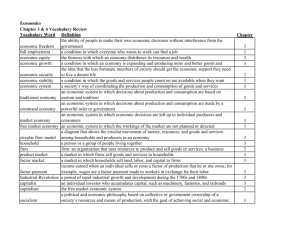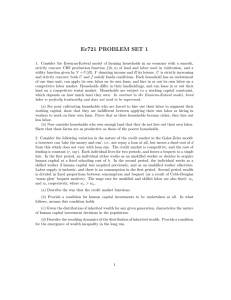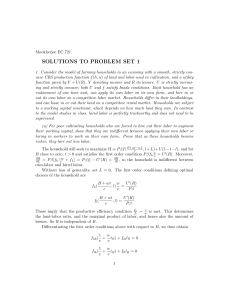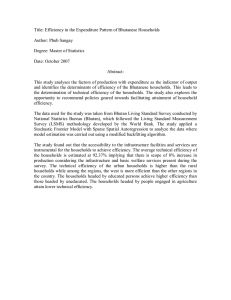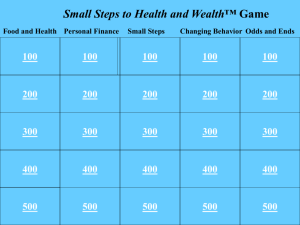Press Release
advertisement
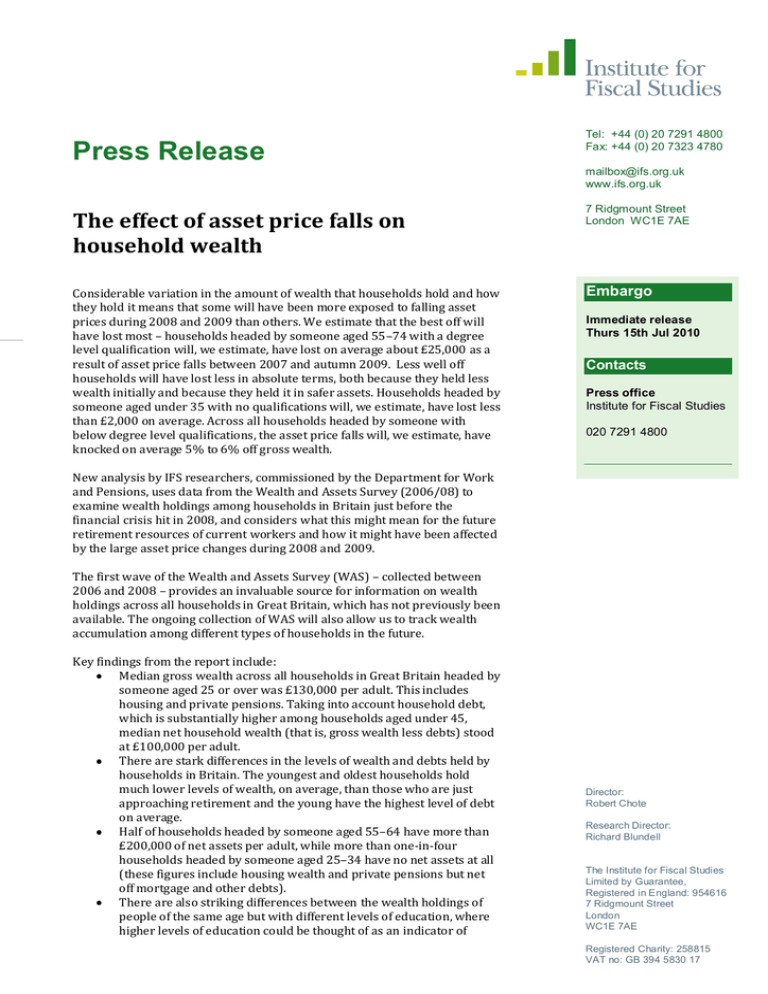
Press Release Tel: +44 (0) 20 7291 4800 Fax: +44 (0) 20 7323 4780 mailbox@ifs.org.uk www.ifs.org.uk The effect of asset price falls on household wealth 7 Ridgmount Street London WC1E 7AE Considerable variation in the amount of wealth that households hold and how they hold it means that some will have been more exposed to falling asset prices during 2008 and 2009 than others. We estimate that the best off will have lost most – households headed by someone aged 55–74 with a degree level qualification will, we estimate, have lost on average about £25,000 as a result of asset price falls between 2007 and autumn 2009. Less well off households will have lost less in absolute terms, both because they held less wealth initially and because they held it in safer assets. Households headed by someone aged under 35 with no qualifications will, we estimate, have lost less than £2,000 on average. Across all households headed by someone with below degree level qualifications, the asset price falls will, we estimate, have knocked on average 5% to 6% off gross wealth. Embargo Immediate release Thurs 15th Jul 2010 Contacts Press office Institute for Fiscal Studies 020 7291 4800 New analysis by IFS researchers, commissioned by the Department for Work and Pensions, uses data from the Wealth and Assets Survey (2006/08) to examine wealth holdings among households in Britain just before the financial crisis hit in 2008, and considers what this might mean for the future retirement resources of current workers and how it might have been affected by the large asset price changes during 2008 and 2009. The first wave of the Wealth and Assets Survey (WAS) – collected between 2006 and 2008 – provides an invaluable source for information on wealth holdings across all households in Great Britain, which has not previously been available. The ongoing collection of WAS will also allow us to track wealth accumulation among different types of households in the future. Key findings from the report include: Median gross wealth across all households in Great Britain headed by someone aged 25 or over was £130,000 per adult. This includes housing and private pensions. Taking into account household debt, which is substantially higher among households aged under 45, median net household wealth (that is, gross wealth less debts) stood at £100,000 per adult. There are stark differences in the levels of wealth and debts held by households in Britain. The youngest and oldest households hold much lower levels of wealth, on average, than those who are just approaching retirement and the young have the highest level of debt on average. Half of households headed by someone aged 55–64 have more than £200,000 of net assets per adult, while more than one-in-four households headed by someone aged 25–34 have no net assets at all (these figures include housing wealth and private pensions but net off mortgage and other debts). There are also striking differences between the wealth holdings of people of the same age but with different levels of education, where higher levels of education could be thought of as an indicator of Director: Robert Chote Research Director: Richard Blundell The Institute for Fiscal Studies Limited by Guarantee, Registered in England: 954616 7 Ridgmount Street London WC1E 7AE Registered Charity: 258815 VAT no: GB 394 5830 17 higher potential lifetime earnings. Median net wealth among households headed by someone aged 55–64 with a degree-level qualification is more than twice as high as that among households of the same age headed by someone with below degree-level qualifications, and six times as high as those headed by someone with no qualifications at all. Low education households hold most of their wealth in easily accessible, safe assets (such as savings accounts at banks and building societies). They hold very little wealth in risky assets, such as stocks and shares. The most common “risky” asset held by low education households is housing. High education households hold much more of their wealth in explicit retirement savings vehicles than households with low and mideducation do. Though the values of financial assets, such as stocks and shares fluctuated more dramatically over the period 2007 to 2009 than house prices, the greater importance of housing in most households’ wealth portfolios means that changes in house prices will have been the greatest driver of changes in wealth levels for most households. Young households, who had less wealth initially, will have lost less on average in absolute terms than older households as a result of asset price falls during 2008 and 2009. But they will have lost a greater proportion of their net assets as a result of house price changes than older households, as they have high levels of mortgage debt (relative to the value of their homes) on average. Current household wealth holdings have important implications for the future adequacy of retirement provision. This remains a hotly debated issue, with the new coalition government already having announced reviews of occupational pension provision in both the public and private sectors. Given the levels of wealth we observe, it seems that it is mid educated households for whom the outlook for retirement resource adequacy is most uncertain. For these households, state benefits probably will not provide a very high level of earnings replacement in retirement, but their private wealth holdings are not sufficiently high, on average, to provide substantial private income . Gemma Tetlow, a senior research economist at the IFS and one of the report’s authors commented: “There is considerable variation in the amount of wealth and the types of assets that households in Great Britain held just before the financial crisis. Half of households had assets worth at least £100,000 per adult, but one-infour households headed by someone aged 25 to 34 had no assets at all. Those with low levels of wealth hold most of it in safe, easily accessible assets like bank accounts, while those with more wealth are more likely to hold private pensions, stocks and shares.” Rowena Crawford, a research economist at IFS and another of the authors of the report added: “Asset price falls during 2008 and 2009 will have affected household wealth levels. We estimate that absolute losses of wealth from asset price falls during 2008 and 2009 will have been largest among high education households around retirement – at approximately £25,000 on average – as they had high levels of wealth initially and held a relatively large share of this in risky assets like housing, stocks and shares. However, it is also important to take account of households’ debts. If we look at households’ wealth net of mortgage and other debts, it is younger households who are likely to have lost the greatest fraction of their net wealth as a result of house price falls because they had relatively large outstanding mortgages.” The Institute for Fiscal Studies Limited by Guarantee, Registered in England: 954616 7 Ridgmount Street London WC1E 7AE ENDS Notes to Editors: 1. The analysis was undertaken by James Banks, Rowena Crawford and Gemma Tetlow and is published as a DWP Research Report titled “What does the distribution of wealth tells us about future retirement resources?”. This work was funded by the Department for Work and Pensions. 2. This report is based on data from the first wave of the Wealth and Assets Survey (WAS), which collected information on the wealth holdings of 30,595 households in Great Britain between July 2006 and June 2008. These data are funded by a consortium of UK government departments and are collected and administered by the Office for National Statistics (ONS). We are grateful to them for allowing us to use the data for this report. Further information on WAS is available from the ONS: http://www.statistics.gov.uk/StatBase/Product.asp?vlnk=15074&Pos=1&ColRa nk=1&Rank=192. 3. Copies of the report will be available from http://research.dwp.gov.uk/asd/asd5/rrs-index.asp on 15th July. For any queries, contact: IFS Press office, 020 7291 4800 The Institute for Fiscal Studies Limited by Guarantee, Registered in England: 954616 7 Ridgmount Street London WC1E 7AE
